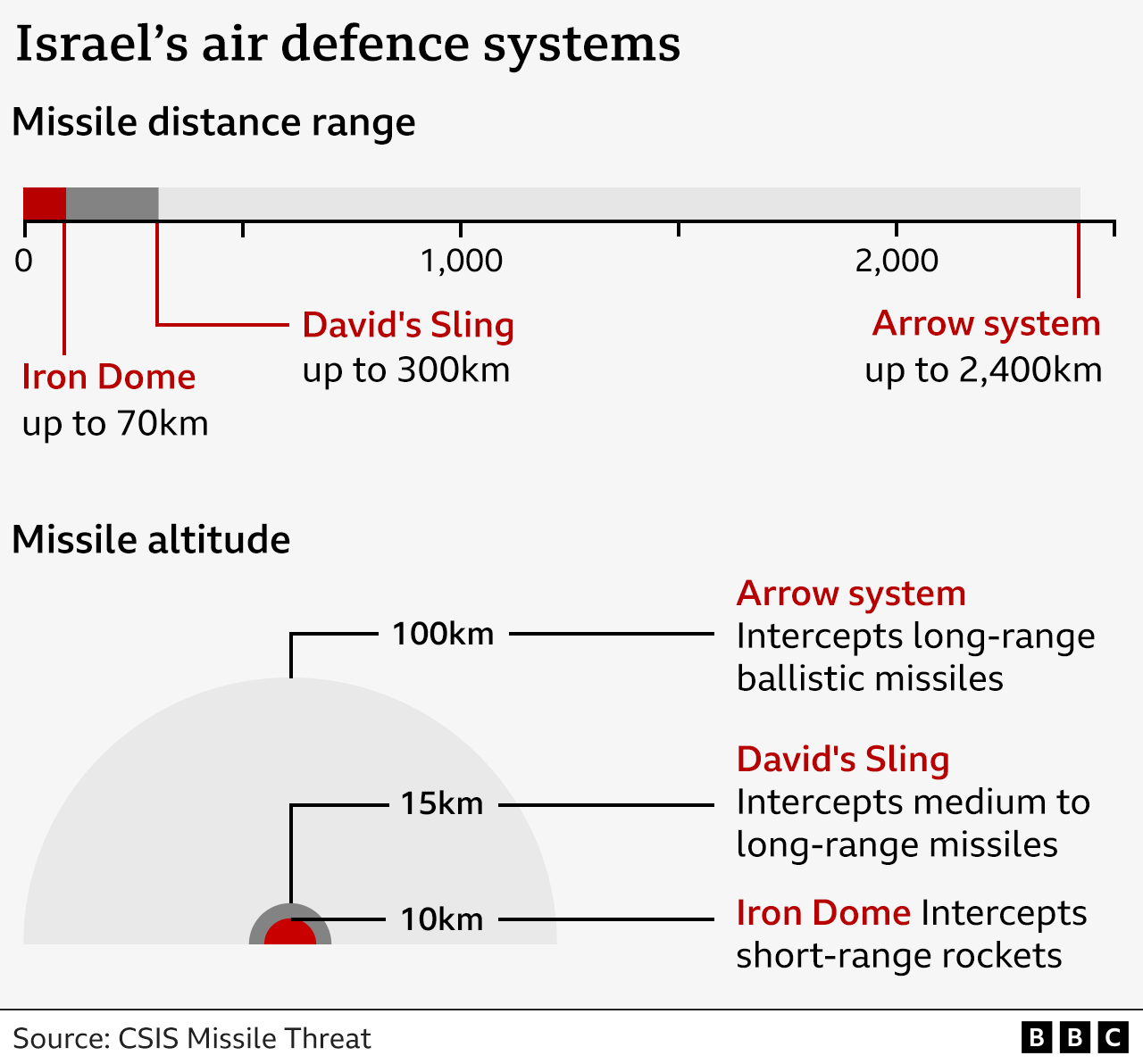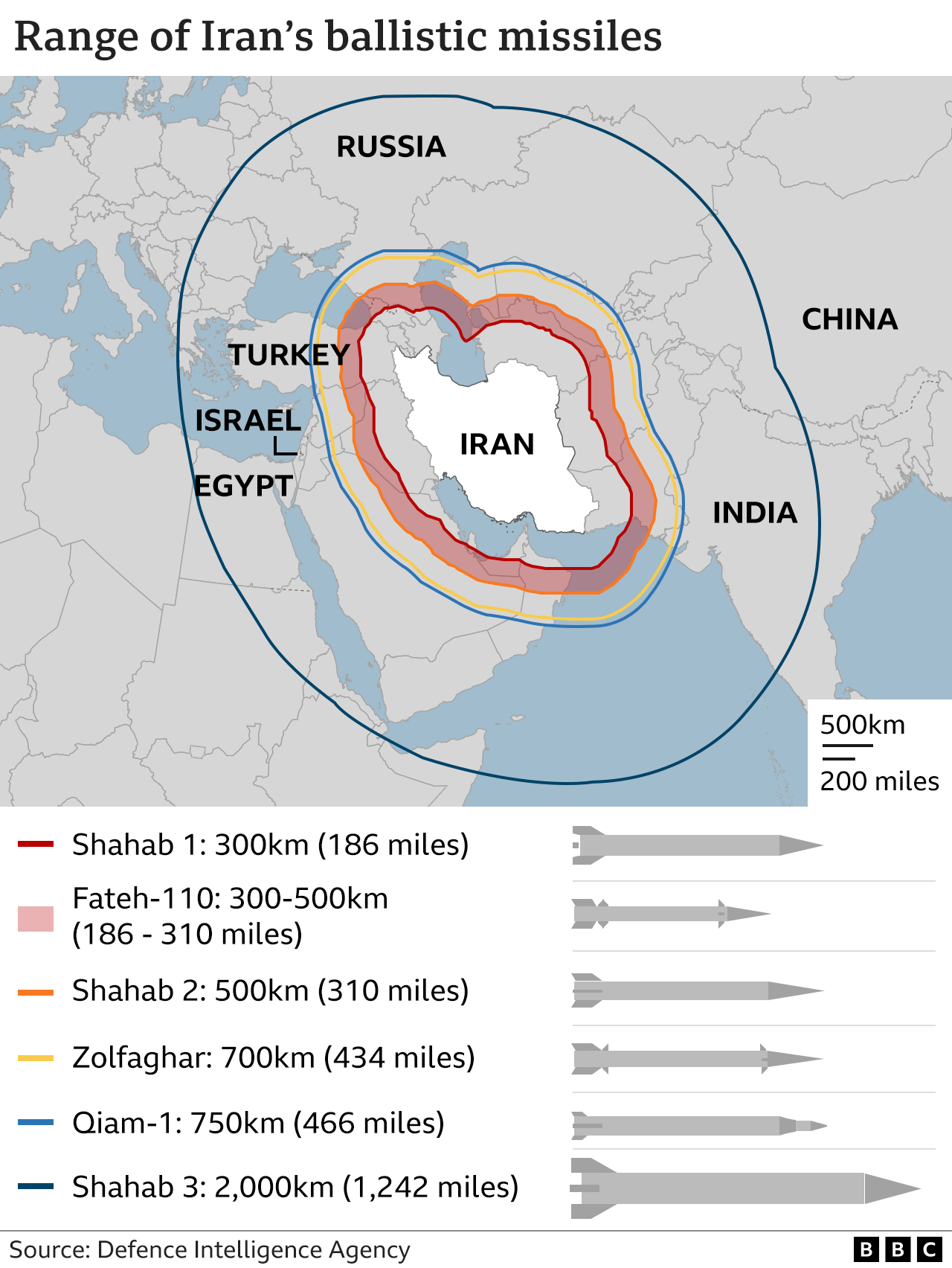What we know about Iran's missile attack on Israel
Analysing where Iran's missiles struck in Israel
- Published
Iran launched almost 200 ballistic missiles towards Israel on Tuesday night.
The Israeli military said most of the missiles were intercepted, but that a small number struck central and southern Israel. The only person reported to have been killed was a Palestinian man in the occupied West Bank.
It was Iran’s second such attack on Israel this year, after it launched about 300 missiles and drones in April.
Here's what we know so far.
What was the scale of Iran's attack?
The Israel Defense Forces (IDF) said the attack involved more than 180 missiles, which tallied with Iranian state media reports saying that about 200 missiles were launched.
The US said the attack was “nearly twice the scope” of what happened in April.
Sirens sounded as Israel’s entire 10 million population was told to head into bomb shelters at about 19:30 local time (16:30 GMT) on Tuesday.
Social media videos verified by the BBC showed missiles flying over the densely populated cities of Tel Aviv and Jerusalem less than 15 minutes later. Explosions could be heard overhead as air defences intercepted the incoming missiles.
The footage also showed several missiles hitting areas around the Nevatim airbase in the Negev desert and the headquarters of the Mossad spy agency near Tel Aviv.
“There were a small number of hits in the centre of Israel, and other hits in southern Israel,” said IDF spokesman Rear Adm Daniel Hagari. “The majority of the incoming missiles were intercepted by Israel and a defensive coalition led by the United States.”
The Israeli military confirmed on Wednesday some of its air bases had been hit during the attack, but said no weapons, aircraft or critical infrastructure was damaged and the air force's operational abilities were not affected.
Iranian state media cited the Islamic Revolution Guard Corps (IRGC) as saying the missiles hit Nevatim, Hatzerim and Tel Nof airbases, as well as Israeli tanks in Netzarim - a reference to an Israeli military corridor in central Gaza - and gas installations in the southern city of Ashkelon.
The semi-official Tasnim news agency said Iran had for the first time used Fattah hypersonic missiles that it claimed "cannot be intercepted", as well as Emad and Qadr ballistic missiles. However, the IDF said the barrage did not include any hypersonic missiles, according to Israeli media.
What damage and casualties have been reported?
On Wednesday, the IDF said several air force bases were damaged in the missile attack, but that no aircraft were damaged, according to Israeli media reports.
“Only administrative buildings and peripheral components were hit,” the IDF was quoted as saying, while adding that “upcoming missions remain unaffected".
The IDF also reportedly said that damage to infrastructure and property in civilian areas was “only minor” and was likely to have been caused by shrapnel from intercepted missiles.
Just north of Tel Aviv on Wednesday, close to the Mossad’s headquarters, a BBC correspondent found several badly damaged cars and a pile of earth next to a road where a missile impact was said to have caused a crater between 8m and 10m deep.
The nearby municipality of Hod HaSharon also said about 100 houses were damaged by a missile explosion and shrapnel. "This was a very powerful impact with a huge risk of claiming human lives," the municipality said.
And a video released by the IDF showed the head of its Home Front Command visiting a school that was hit by a missile in the Gedera area, external, just to the east of Ashkelon, causing extensive damage to a classroom.
Israel’s Magen David Adom ambulance service paramedics treated two people with light injuries from shrapnel in the Tel Aviv area, as well as some people with minor injuries caused by falling as they moved to shelters.
However, the Palestinian Civil Defence authority said a Palestinian man was killed when he was hit by a falling missile fragment in the West Bank city of Jericho.
CCTV footage showed the rear half of a large, black missile plummeting directly on to a man as he walks along a road at night. It was not clear if the missile had been intercepted.
The New York Times identified him as Sameh al-Asali, external, a 37-year-old Palestinian construction worker from Gaza who had been sheltering in Jericho since the start of the war between Israel and Hamas last October.
Were the missiles stopped by Iron Dome?
The IDF has not provided details about how the missiles were shot down, besides saying that Israeli and US-led forces were involved and that Israeli air defences “operated impressively, with high rates of interception”.
It also did not say exactly how many were intercepted, explaining that it wanted to avoid “giving Iran and Hezbollah information that will help them learn lessons”. The IDF claimed that 99% of the Iranian projectiles launched in April’s attack were intercepted.
Israel has a sophisticated system of air defences, the best-known of which is the Iron Dome. It is designed to intercept short-range rockets of the sort fired by Hamas and Hezbollah.
While it was used to defend against some elements of Iran's last attack in April, other elements of the country's "layered" defence systems probably did the bulk of the work on Tuesday.
David’s Sling - a joint US-Israeli manufactured system - is used to intercept medium to long-range rockets, as well as ballistic and cruise missiles. And when it comes to long-range ballistic missiles, which fly outside the Earth’s atmosphere, Israel has the Arrow 2 and Arrow 3 interceptors.
The Pentagon said two US Navy destroyers deployed in the Eastern Mediterranean fired a dozen interceptors as part of the efforts to defend Israel, but that it was not known whether they took down any of the missiles.
UK Defence Secretary John Healey said British forces had "played their part in attempts to prevent further escalation”. But the BBC understands that British military jets did not shoot down any Iranian missiles.
Verified footage also showed missile interceptions over the Jordanian capital, Amman. The Arab kingdom’s forces also shot down a number of missiles during Iran's last attack in April.

Why did Iran attack Israel?
The IRGC said in a statement that the missile barrage was retaliation for what it called the "violation of Iran’s sovereignty and the martyrdom” of Hamas political leader Ismail Haniyeh, who was killed by an explosion in Tehran in July that Iranian officials blamed on Israel, but Israeli officials did not claim.
The statement described the barrage as having been "in line with the legitimate right of the nation to defend itself”.
It also said the attack was in response to the Israeli air strike in the southern suburbs of Beirut last Friday that killed Hezbollah leader Hassan Nasrallah and Brig-Gen Abbas Nilforoushan, the operations commander of the IRGC’s overseas arm, the Quds Force.
A senior Iranian official told Reuters news agency the country's Supreme Leader, Ayatollah Ali Khamenei, had personally given the order for Tuesday's missile attack.
The escalation also came hours after Israeli troops began an invasion of southern Lebanon to remove what the military said were "Hezbollah terror targets” in border villages that posed a threat to residents of northern Israel.
Israel has gone on the offensive against the Shia Islamist political and military organisation after almost a year of cross-border hostilities sparked by the war with Hamas in Gaza. Both Hezbollah and Hamas are backed by Iran and designated as terrorist organisations by Israel, the US, UK and others.
Iran does not recognise Israel's right to exist and seeks its eradication. It has spent years building a network of armed groups across the Middle East, known as the “Axis of Resistance”, which are opposed to Israel and the US.
Israel believes that Iran poses an existential threat and has spent years engaged in a shadow war with Iran that has is now increasingly out in the open.
How has Israel reacted?
Israel’s Prime Minister, Benjamin Netanyahu, told a cabinet meeting on Tuesday night that Iran’s missile attack “failed”, having been “thwarted thanks to Israel’s air defence array”.
“Iran made a big mistake tonight and it will pay for it,” he added. “The regime in Iran does not understand our determination to defend ourselves and our determination to retaliate against our enemies.”
Defence Minister Yoav Gallant also vowed vengeance.
"Iran has not learned a simple lesson - those who attack the state of Israel pay a heavy price," he said in a statement.

Get in touch
Did you have to take shelter from the attack tonight? If it is safe to do so please get in touch.
What has been the international reaction?
US President Joe Biden reaffirmed US support for Israel after the missile attack, describing it as "defeated and ineffective".
Defence Secretary Lloyd Austin also condemned what he called "this outrageous act of aggression by Iran".
UK Prime Minister Sir Keir Starmer said the UK stood with Israel and recognised her "right to self-defence".
France and Japan also condemned Iran's attack, but also called on all parties to avoid further escalation.
Did Iran warn the US that it was going to attack?
The US told Israel before the attack that it had intelligence indicating that Iran was preparing to launch ballistic missiles imminently, which allowed the IDF to warn Israeli civilians to be prepared to seek shelter.
However, US officials said after the attack that they had received no warning from the Iranian government.
Iran’s mission to the UN also said in a statement: “No notice was given to the United States prior to our response.”
The Wall Street Journal citing Arab officials in the region as saying that Iran “telegraphed” to Arab countries on Monday night that it was going to launch an attack similar in scale to April’s, external.
The officials also said Israel had sent clear messages back to Iran that it would respond to any attack on Israeli territory with a strikes that targeted Iranian nuclear or oil facilities.
What happens next?
The IDF’s Chief of Staff, Lt Gen Herzi Halevi, said: “We will choose when to exact the price and demonstrate our precise and surprising offensive capabilities, in accordance with the directive of the political echelon."
Axos cited Israeli officials as saying that Israel’s response would be “significant” and that it could target oil production facilities inside Iran and other strategic sites, external.
Some analysts suggested that Iran’s nuclear facilities could also be targeted.
President Biden said the US was “fully supportive of Israel” and that he would discuss a response with Israel’s prime minister.
But Biden made clear that he saw any Israeli strike on Iran’s nuclear sites as off limits. Asked by reporters whether he would support such an attack, he said: "The answer is no."
The IRGC warned that Iran’s response would be "crushing" if Israel dared to retaliate.
Israel responded to April’s attack by launching a missile that hit an air defence battery at an Iranian airbase, following Western calls for restraint.